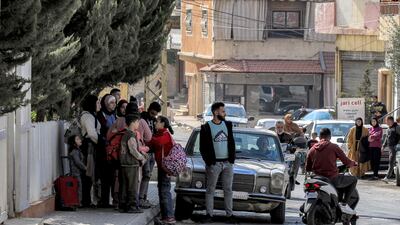“Large numbers of people continue to flee their homes every day, as Israel’s military operations in Lebanon have been going on unabated.” These disturbing words could be from almost any news report about Israel’s invasion of its northern neighbour over the past month. However, they can be found in a report by the Norwegian Refugee Council’s Internal Displacement Monitoring Centre issued on July 27, 2006.
Then, as now, the ancient city of Baalbek has found itself in the firing line. What is different this time is that the city’s entire population has been ordered out by the Israeli military. The displacement of a whole urban centre is a moment to take stock of a year-long conflict that has claimed more than 2,700 lives in Lebanon so far and displaced about 1.4 million people, according to Lebanese government data. In Israel two people were killed on Thursday in a rocket strike from Lebanon into the Haifa Bay area, according to the Israeli ambulance services. Tens of thousands of Israelis have had to leave their homes in northern Israel due to daily rocket fire from Hezbollah.
In Lebanon, the traumatic effects of such death and large-scale displacement in a country of fewer than six million people are profound. In addition to the grief, homelessness and poverty it has created, there has been widespread disruption to almost every aspect of daily life. Education is one example; writing on Wednesday, Fadlo Khuri, the president of the American University of Beirut, said that as of October 21 “50 per cent of our student body has been displaced, and 25-30 per cent of our faculty and staff are either displaced or have taken multiple family members into their homes. Nothing of what we are experiencing in the fall of 2024 could pass for normal. Or acceptable”.
The mass displacement of a whole city should be unacceptable. And yet, the uprooting of non-combatants has been a core doctrine thinking since the 1948 mass expulsion of Palestinians from what would become Israel. Moshe Dayan, a pivotal Israeli military and political leader, articulated this in June 1950 when he said: “If we try to search for that Arab, it has no value. But if we harass the nearby village...then the population there comes out against the [infiltrators] ... The method of collective punishment so far has proved effective...There are no other effective methods.”
As Lebanese civilians are punished for the actions of Hezbollah by being told to get out of their homes, top US officials, including CIA Director William Burns, are in the region as Washington seeks de-escalation. Indeed, Mr Burns yesterday held talks with Egyptian President Abdel Fattah El Sisi about reaching a much-needed ceasefire in Gaza. However, the reality is that as badly as a halt to the violence is needed in Gaza, the attempt to empty a whole city such as Baalbek shows that a ceasefire is needed in Lebanon just as urgently.
Lebanon's caretaker Prime Minister Najib Mikati has expressed hope that a deal can be reached within days and Israel's public broadcaster has published what it says is a draft agreement that would include a 60-day truce. This may provide some optimism that civilians on both sides of the Lebanon-Israel border can think about eventually returning home, but this must be tempered with the knowledge that without a lasting political deal, as Baalbek Mayor Mustafa Al Chal told The National this week: "Nowhere is safe, not even the ruins.”
Live updates: Follow the latest on Israel-Gaza


